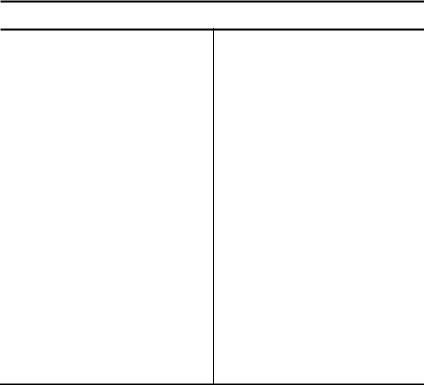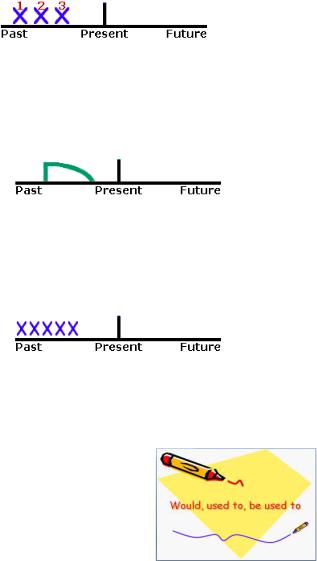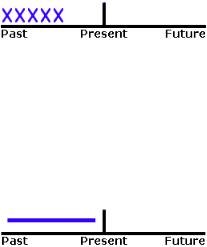
English Grammar in Context
.pdf
U n i t 2
PRESENT PERFECT VS.
PRESENT PERFECT CONTINUOUS
Present Perfect Tense |
Present Perfect Continuous Tense |
(+)
I / you / we / they have driven. He / she / it has gone.
(–)
I / you / we / they haven’t driven. He / she / it hasn’t gone.
(?)
Have I / you / we / they driven? Has he / she / it gone?
(+)
I / you / we / they have been driving. He / she / it has been going.
(–)
I / you / we / they haven’t been driving. He / she / it hasn’t been going.
(?)
Have I / you / we / they been driving? Has he / she / it been going?
11

We use Present Perfect if: |
|
We use Present Perfect Continuous for: |
|||||||||
1) an action happened at an |
1) an activity that has recently stopped |
||||||||||
unspecified |
time |
before |
now. |
or just stopped. There is a connection |
|||||||
The exact time is not |
with now: |
|
|||||||||
important. |
|
|
|
|
|
|
You're out of breath. Have you been |
||||
I think I have met him once |
running? (you're out of breath now) |
||||||||||
before. |
|
|
|
|
|
|
|
|
|||
2) |
you |
describe |
|
your |
2) an activity which is still happening |
||||||
experience. |
It |
is |
like |
saying, |
How long have you been learning |
||||||
“I have the experience of...” |
English? (you're still learning English) |
||||||||||
You |
can also |
use |
this |
tense |
Tim is still watching television. He's been |
||||||
to say that you have never had |
|||||||||||
watching television all day. |
|
||||||||||
a |
certain |
experience. |
The |
|
|||||||
|
|
||||||||||
Present Perfect |
is NOT |
used |
3) actions repeated over |
a period |
|||||||
to describe a specific event. |
|||||||||||
I have been to France three |
of time: |
|
|||||||||
Debbie is a very good tennis player. |
|||||||||||
times. |
|
|
|
|
|
|
|||||
It means that that you have had |
She's been playing since she was eight. |
||||||||||
the |
|
experience |
|
of |
|
being |
|
|
|||
in France. |
|
|
|
|
|
|
State verbs |
|
|||
3) we talk about change that |
There are some verbs (for example, |
||||||||||
has |
|
happened |
over |
a |
period |
know/like/believe) that are |
normally |
||||
of time |
|
|
has |
become |
not used in the continuous: |
|
|||||
The |
government |
I've known about it for a long time. |
|||||||||
more |
interested |
|
in |
|
arts |
(not 'I've been knowing') |
|
||||
education. |
|
|
|
|
|
|
For a list of these verbs, see Unit 1 |
||||
|
|
|
|
|
|
|
|
|
|||
4) we list the accomplishments of individuals and humanity. You cannot mention a specific time.
Man has walked on the Moon.
Our son has learned how to read.
5) we talk about several different actions which have occurred in the past at different times. Present Perfect suggests the process is not complete and more actions are possible.
12

Time expressions
Just = a short time ago:
'Would you like something to eat?' 'No, thanks. I've just had lunch.' already = something happened sooner than expected
'Don't forget to post the letter, will you?' 'I've already posted it.’
Yet = 'until now' and shows that the speaker is expecting something to happen. Use yet only in questions and negative sentences
Has it stopped raining yet?
I've written the letter but I haven't posted it yet.
Ever, never
Have you ever eaten caviar? (in your life)
We've never had a car.
Recently, lately, so far, up to now, until now / till now
We haven't heard from him recently (=lately / of late).
since or ever since with a specific month, year or a period in the past
I have been jogging in this park since 2002.
He has been staring at the wall ever since he heard the news.
for with a number of hours, days, months, years
She’s been talking on the phone for 3 hours.
Difference in Meaning:
Present Perfect vs. Present Perfect Continuous
Present Perfect |
Present Perfect Continuous: |
|
|
|
|
|
Result |
Duration |
The ceiling was white. Now it is |
Ann's clothes are covered in paint. |
|
blue. She has painted the ceiling. |
She has been painting the ceiling. |
|
has painted is the present perfect |
has been painting is the present |
|
simple. |
|
perfect continuous |
Here, the important thing is that |
We are interested in the activity. |
|
something |
has been finished. |
It does not matter whether something |
'Has painted' is a completed action. |
has been finished or not. In this |
|
We are interested in the result of the |
example, the activity (painting the |
|
activity (the |
painted ceiling), not |
ceiling) has not been finished. |
in the activity itself. |
|
|
13
Emphasis on completion |
|
|
Duration |
|
|
I have done my homework. |
I have been doing my homework. |
||||
(Meaning: My homework |
is |
(Meaning: That's how I have spent |
|||
completed now.) |
|
my time. It does not matter |
|||
|
|
whether |
the |
homework |
is |
|
|
completed now.) |
|
||
desired result |
|
unwanted side effect |
|
||
I have washed the car. (Result: |
Why are you so wet? – I have been |
||||
The car is clean now.) |
|
washing |
the |
car. (side effect: |
|
|
|
I became wet when I was washing the |
|||
|
|
car. It does not matter whether the car |
|||
|
|
is clean now.) |
|
|
|
since the last time |
|
since the beginning |
|
||
I haven't played that game for |
I haven't been playing that game for |
||||
years. (Meaning: It's years ago |
an hour, only for 10 minutes. |
||||
that I last played that game.) |
|
(Meaning: It's not even an hour |
|||
|
|
ago that I started to play that |
|||
|
|
game.) |
|
|
|
permanent |
|
temporary |
|
|
|
James has lived in this town for |
James has been living here for a |
||||
10 years. (Meaning: He |
is |
year. (Meaning: This situation is |
|||
a permanent resident of this |
only temporary. Maybe he is an |
||||
town.) |
|
exchange student and only here for |
|||
|
|
one or two years.) |
|
||
Have been to / have been in / have gone to
Jim is on holiday. He has gone to Spain. (= he is there now or on his way there)
Peter has been in Rome for 3 days. (= he is there now, he arrived in Rome 3 days ago)
Jane is back home from holiday now. She has been to Italy. (= she has now come back from Italy)
Let’s Practice
1. Write positive sentences in present perfect simple
The following people have just completed an action. Bob / visit / his grandma
Jimmy / play / on the computer Sue and Walter / wash / their car Andrew / repair / his bike
Tom and Alice / be / to a restaurant
14

2. Write negative sentences in present perfect simple.
The weather was wonderful today. So the children were in the park all afternoon and have not done their household chores:
Sarah / not / wash the dishes Anita / not / clean the kitchen
Maureen and Gavin / not / water the plants Joey / not / make his bed
Aran and Jack / not / do their homework
3. Write questions in present perfect simple.
you / answer / the question Jenny / lock / the door Walter / call / us
you / see / the picture
your parents / get / the letter
|
4. Read the text about Loch Ness and complete the sentences. |
||
|
Loch Ness is a lake between |
||
the |
Scottish |
towns of |
Inverness |
and Fort Augustus. The word loch |
|||
is |
Scottish |
for lake. Loch Ness |
|
is about 37 km long and extremely |
|||
deep, the deepest part |
is 226 m. |
||
Loch Ness is famous for its friendly monster, Nessie. Most people think that this is only a legend, but every
year tourists from all over the world come to Loch Ness and hope that they will see the monster.
1.Tourists from all over the world (be) ____________ to Loch Ness.
2.Most of them (see / not) __________________ Nessie, however.
3.Only very few people say that the Loch Ness Monster (appear)
_______________ in front of them.
4.Even scientists (come) ___________ to Loch Ness to find the monster.
5.And the boss of the Guinness brewery (promise) ____________ to pay 500,000 pounds to the person who catches Nessie.
5. What are some of the things have you already accomplished at this time in your life?
Make a list of two or three things you have already done in life. Share what you are most proud of, and talk about some of your peers’ greatest achievements. You need to ask follow-up questions to find out the details.
15

6.Which form is correct: Present Perfect Simple or Present Perfect Continuous?
1.We want to tell how we have spent our time: We have played football /
We have been playing football.
2.The action is completed now: Charly has sent the letter. / Charly has been sending the letter.
3.I want to tell how I have spent my time: I have watched TV. / I have been watching TV.
4.I want to emphasise that the door is open now: Elizabeth has opened the door. / Elizabeth has been opening the door.
5.I want to emphasise that the house is ready now: My friends have built a house. / My friends have been building a house.
7.Put the verbs into the correct tense: Present Perfect Simple or Present Perfect Continuous
1.I (play) ____________________ football for five years.
2.My team (win / only) ________________ wo matches so far.
3.The others (be / always) __________________ better.
4.Are we not there yet? We (walk) ______________ for hours.
5.But we (cover / only) _____________ an area of five miles so far.
8.Complete the conversation with the appropriate tenses: Present Perfect Simple or Present Perfect Continuous
Robin: I think the waiter (forget) ____ us. We (wait) _____
here for over half an hour and nobody (take) ____ our order yet.
Michele: I think you're right. He (walk) ______ by us at least twenty times. He probably thinks we (order, already) ______.
Robin: Look at that couple over there, they (be, only)
________ here for five or ten minutes and they already have
their food.
Michele: He must realize we (order, not) _______ yet! We (sit) _______
here for over half an hour staring at him.
Robin: I don't know if he (notice, even) ____________ us. He (run) from table to table taking orders and serving food.
Michele: That's true, and he (look, not) ______________ in our direction once.
16

9.Act out a similar conversation.
10.Complete the conversation with the appropriate tenses: Present Perfect Simple or Present Perfect Continuous
Mr. Smith: So tell me a little bit about yourself, Mr. Harris. I would like to find out a little bit more about your background.
Mr. Harris: I (work) _____in the insurance industry for over ten years. I worked for Met Life for six years and World Insurance for four and a half. During that time, I heard many good things about Hollings Life Insurance and that's why I (apply) ______ for the new sales position.
Mr. Smith: Tell me a little about your hobbies and interests.
Mr. Harris: In my spare time, I hike in the mountains outside of town, volunteer at the Sierra Club and play tennis. In fact, I (compete) ___________
in a tennis tournament this weekend.
Mr. Smith: Really, how long (you, play) ________ tennis?
Mr. Harris: I (play) __________ since high school. I love the sport.
Mr. Smith: Great! We like dedication here at Hollings Life. You mentioned you volunteer at the Sierra Club. I (work, currently) ________ with them on the sea turtle project. We (try) __________ to create a wildlife sanctuary near the bay.
Mr. Harris: Do you know Frank Harris? He's my brother. He (work, presently) ________ on the same project.
Mr. Smith: I know Frank quite well. Any brother of Frank's would be a welcome addition to Hollings Life. Just one more thing, we (look) ________
for somebody who is fluent in Spanish; many of our clients are from Mexico. Mr. Harris: No problem. I (study) __________ Spanish since elementary
school.
Mr. Smith: Sounds like you are the perfect candidate.
11. Role play. Job interview. Work in groups of 4.
Students A and B: you are parents who want to hire a babysitter for your child. Work out a list of questions (at least 5) that you want to ask prospective babysitters. Your goal is to find out the jobseekers’ experience of childcare.
Students C and D: you are seeking a job of a babysitter. Think of 3 questions you want to ask your prospective employers. Your goal is to get a job as a babysitter.
17

U n i t 3
PAST SIMPLE VS. USED TO
William Shakespeare was an English poet, playwright and an actor. He was born and grew up in Stratford- upon-Avon. At the age of 18, he married Anne Hathaway, with whom he had three children. Between 1585 and 1592, he began a successful career in London as an actor and a writer. Shakespeare produced most of his known work between
1589 and 1613. He died in 1616.
Was / grew up / married / had / began / produced are all past simple
(+)
|
I/ we/ you / they / |
drove / went / |
||
|
he / she/ it |
worked |
||
|
|
|
|
|
|
(?) |
|
|
|
|
|
|
|
|
|
Did |
I / we/ you / |
drive / go / |
|
|
|
they / he / |
work? |
|
|
|
she / it |
|
|
|
|
|
|
|
|
(–) |
|
|
|
|
|
|
|
|
|
I / we/ you / |
didn’t |
drive / go / |
|
|
they / He / |
|
work |
|
|
she / it |
|
|
|
|
|
|
|
|
We use Past Simple:
1) to express the idea that an action started and finished at a specific time in the past. Sometimes, the speaker may not actually mention the specific time, but they do have one specific time in mind.
Example: I saw a movie yesterday.
18

2) to list a series of completed actions in the past. These actions happen 1st, 2nd, 3rd, 4th, and so on.
Example: I finished work, walked to the beach, and found a nice place to swim.
3) to describe a duration which starts and stops in the past. A duration is a longer action often indicated by expressions such as: for two years, for five minutes, all day, all year, etc.
Example: I lived in Brazil for two years.
4) to describe a habit which stopped in the past. It can have the same meaning as “used to”. To make it clear that we are talking about a habit, we often add expressions such as: always, often, usually, never, when I was a child, when I was younger, etc.
Examples: I studied French when I was a child.
•He played the violin.
•He didn't play the piano.
•Did you play a musical instrument when you were a kid?
•She worked at the movie theater after
school.
•I used to go to the beach every day.
•I would go to the beach every day.
•I am used to going to the beach every
day.
used to do = would (past habit)
Be used to doing (present habit)
19

Habit in the Past
“Used to” expresses the idea that something was an old habit that stopped in the past. It indicates that something was often repeated in the past, but it is not usually done now. “Would” can be used for repetitive actions in the past.
Example: Sam and Mary used to go to Mexico in the summer. = Sam and Mary would go to Mexico in the summer
Past Facts and Generalizations
«Used to» can also be used to talk about past facts or generalizations which are no longer true.
Example: I used to live in Paris.
It is better not to use “used to” in questions or negative forms; however, this is sometimes done in informal spoken English. It is better to ask questions and create negative sentences using Simple Past.
Both Simple Past and “Used to” can be used to describe past habits, past facts and past generalizations; however, “used to” is preferred when emphasizing these forms of past repetition in positive sentences. On the other hand, when asking questions or making negative sentences, Simple Past is preferred.
Example: You used to play the piano.
Do not confuse I used to do and I am used to doing. The structures and meanings are different:
•* I used to live alone. (= I lived alone in the past but I no longer live
alone)
•* I am used to living alone. (= I live alone and I don't find it strange or new because I've been living alone for some time)
20
